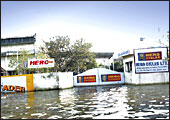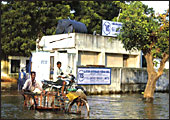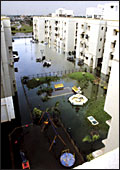|
CHENNAI
Sunday, December 4
It's
half past one in the morning, and I am standing on the nondescript
Kotturpuram bridge. No, I am not about to throw myself off the
bridge. Instead, like dozens of disaster tourists around me, I
am peering into the dark, oily water swirling up in volumes that
the residents of this water-scarce city have seldom seen. Torrential
rains over two straight days have finally drowned the city, already
limping from two previous rainstorms. In the early hours of Saturday,
authorities have been forced to release about 17,000 cusecs of
water from the Chembarambakkam lake and the Red Hills reservoir.
That has caused the already swollen Adyar and Cooum rivers, which
snake through the city on their way to the sea, to flood their
banks, devastating low-lying areas along the waterways.
 |
| Disaster zone: Industrial units like
this one in Ambattur have been the worst hit and recovery
will be a long haul |
Driving towards Kottur, we are forced at one
point to turn back as we meet water rising menacingly in the narrow
street in front of our eyes. It's a poor neighbourhood, and people
are lining up outside their homes, waiting quite passively for
the flooding to begin. As always, the poor are the worst hit,
and these tenements and slums closest to the rivers will soon
be washed out. And the loss to business is, of course, tremendous.
Shops, offices, factories, and schools are closed, commuting has
halted, and with pillar-boxes under water, electricity has been
cut off to many areas. After Mumbai and then Bangalore, all this
now looks very familiar.
The Adyar river runs alongside the Guindy
Industrial Estate (GIE), a major hub for small and tiny scale
industries in the city. That morning, factory owners, hearing
of the impending water release, rushed to move machinery and stores
out of ground floors and basements to higher floors. Within hours,
water gushed in, rising well over eight feet in the worst affected
parts. Later that evening, I am talking to Vijay Subramaniam,
who owns an SSI unit there. He has been there all day with his
workers, trying to contain the damage: "We are under eight
feet of water, I have taken out what I can, but there's machinery
bolted to the shop floor... motors and generators are ruined."
Of roughly 500 factories in the Guindy Industrial
Estate, about 150 are located along the river and they are the
worst affected. Says T.C. Dayalan, Hony Gen. Secy, Tanstia (Tamil
Nadu Small And Tiny Industries Association): "Losses to units
in the GIE range from Rs 4 lakh to Rs 12 lakh each. Motors, transformers
and finished goods have been destroyed."
 |
| Knee-deep in trouble: Factory owners
fear that delays in delivery may result in loss of export
orders |
The Ambattur Industrial Estate in north Chennai
is another disaster zone. A channel running through the estate
takes most of the overflow from the Red Hills Lake, and the estate
is easily flooded. About 950 units in the north phase are worst
hit. Says K.P. Shashidar Rao, President, Ambattur Industrial Manufacturers
Association (aiema): "The estate has a turnover of about
Rs 5 crore per day. We have lost Rs 20-25 crore." For Ambattur,
the heavens couldn't have opened up at a worse time. Home to a
variety of industries including auto-parts, engineering, garment,
leather, and electrical equipment, it is going through a boom.
Most of the factories, especially auto components and garment
units, are working 24/7 to meet unprecedented export orders. But
this third consecutive rainstorm has caused huge damage. Says
Rao: "We run the risk of our buyers turning elsewhere."aiema
has asked the Central damage assessment team to consider re-routing
the channel outside the estate.
It's about 11.30 on Sunday morning, and I
am driving down Old Mahabalipuram Road. It is the road that goes
from Tidel Park to Siruseri-the stretch proudly termed Chennai's
it Corridor. Well, the it Corridor has collapsed. There is no
tarmac to speak of, just a series of water-filled craters into
which my car falls with a gut-wrenching thud every two minutes.
The traffic has piled up on both sides, a bus and a mini-van have
broken down, adding to the chaos, and when the rain starts again,
the mayhem is complete. Down this road are Infosys, TCS, Cognizant,
Wipro, Orchid Pharma, Grundfos... and many of these units are
under water.
 |
| Ready to dive in?: That's a swimming
pool the builders of this tony apartment complex hadn't planned
on |
It's not just the tangible loss-shops, especially
in the flooded interiors, have stayed shut for days. Restaurants
and cinemas have run empty as the rains kept people at home. It's
going to be a while before the losses can be quantified. Mercifully,
there have been no reports of looting. When this report was being
written, the Union government had given Chennai Rs 500 crore (against
the Rs 13,000 crore asked for) in aid, and another cyclonic storm,
Fanooz, was headed towards the Tamil Nadu coast.
But basically, it's this: after decades of
dry weather, the administration is guilty of being totally unprepared
to meet the heaviest rains to hit Chennai in almost 65 years.
Drainage is miserably inadequate, roads can't handle the pounding...
Worse, with irrigation channels and catchment areas running dry
for decades, there has been large-scale encroachment-slums, colonies
and even factories have been built on lake and canal beds, while
the administration looked the other way. Now, the city is paying
the price for it.
|







